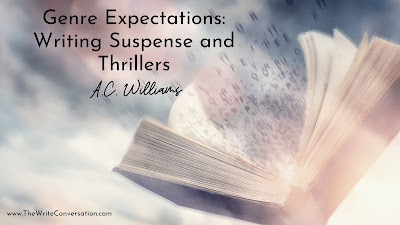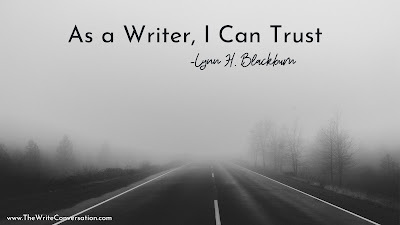Edie Melson's Blog, page 46
July 12, 2024
3 Important Reason to be Proud You're a Writer

by Beth K. Vogt @BethVogt
I don’t know who needs to hear this right now—maybe it’s you.
Lean in and listen close:
I’m proud of you.
But Beth, you say, how can you be proud of me? You don’t know what my writing life is like. You don’t know what this week, this month, this year, has been like for me. You don’t know all the things I haven’t accomplished.
Please take a deep breath, my friend. Stop arguing with me while I say it again: I’m proud of you.
We’ve used 195 days in 2024, which means we have 171 days left in the year. (Yes, I “mathed,” thanks to my trusty iPhone calculator.)
We’re more than halfway through this year and I have no doubt that for some of us—all of us—the year hasn’t gone the way we’ve planned. Even those of us who’ve won writing contests or landed an agent or signed a contract, there still have been disappointments and difficult times.
That’s why I’m taking today to cheer you on. Why? Sit back and I’ll tell you.
I’m proud of you for setting goals. Even if you didn’t achieve every single writing objective, you aimed for something, right? You tried. Remember this: “One of the secrets of life is to make stepping stones out of stumbling blocks.” Jack Penn (1909-1996) surgeon, sculpture, & author
I’m proud of you for persevering. We’re almost halfway through July and you’re still here, pursuing your writing dream. Sure, you may wish things looked different. You haven’t accomplished everything you wanted to. But there’s still time, right? You have today, tomorrow—171 days left in 2024. Remember this: “Life is not easy for any of us. But what of that? We must have perseverance and above all confidence in ourselves. We must believe that we are gifted for something and this thing must be attained.” Marie Curie (1867-1934), physicist and chemist
I’m proud of you for helping others. We’re all busy with both writing life and real life. When you come alongside another writer and encourage them, help them grow so they can achieve their dreams—that’s a beautiful thing. An act of kindness. A sacrifice of time, yes, but also sharing what someone else has done for you. Remember this: “Be true to yourself, help others, make each day your masterpiece, make friendship a fine art, drink deeply from good books—especially the Bible, build a shelter against a rainy day, give thanks for your blessings and pray for guidance every day.”John Wooden (1910-2010), American basketball coach
Be proud of yourself today, my friend. Keep setting and resetting your writing goals, keep persevering, and keep helping other writers!
TWEETABLE3 Important Reason to be Proud You're a Writer, @BethVogt on @EdieMelson (Click to Tweet)
 Beth K. Vogt believes God’s best often waits behind the doors marked “Never.” She’s authored 15 novels and novellas, both contemporary romance and women’s fiction. Beth is a Christy Award winner, an ACFW Carol Award winner, and a RITA® finalist. Her newest contemporary romance novel, Dedicated to the One I Love, released June 20, 2023. Her novel Things I Never Told You, book one in her Thatcher Sisters Series by Tyndale House Publishers, won the 2019 AWSA Golden Scroll Award for Contemporary Novel of the Year. An established magazine writer and former editor of the leadership magazine for MOPS International, Beth blogs for Learn How to Write a Novel and The Write Conversation and also enjoys speaking to writers group and mentoring other writers. She lives in Colorado with her husband Rob, who has adjusted to discussing the lives of imaginary people. Connect with Beth at bethvogt.com.
Beth K. Vogt believes God’s best often waits behind the doors marked “Never.” She’s authored 15 novels and novellas, both contemporary romance and women’s fiction. Beth is a Christy Award winner, an ACFW Carol Award winner, and a RITA® finalist. Her newest contemporary romance novel, Dedicated to the One I Love, released June 20, 2023. Her novel Things I Never Told You, book one in her Thatcher Sisters Series by Tyndale House Publishers, won the 2019 AWSA Golden Scroll Award for Contemporary Novel of the Year. An established magazine writer and former editor of the leadership magazine for MOPS International, Beth blogs for Learn How to Write a Novel and The Write Conversation and also enjoys speaking to writers group and mentoring other writers. She lives in Colorado with her husband Rob, who has adjusted to discussing the lives of imaginary people. Connect with Beth at bethvogt.com.
Published on July 12, 2024 22:00
July 11, 2024
Four Habits to Improve Your Writing

by Lilka Raphael @Lilka_Raphael
“The only way to learn to write is to force yourself to produce a certain number of words on a regular basis.” ― William Knowlton Zinsser
The desire to become a famous author, bestselling novelist, or see your screenplay displayed on a marquee are worthy goals. However, aspiration only gets us so far. Most writers occasionally question their worth. Do I have what it takes? Will anyone take me seriously? Our solitary endeavor and anguish over words is not for the faint of heart. However, the following habits can invigorate our writing and propel us toward success.
1. Be persistentLike other professions, we hone our skills through diligence. The more we do anything, the better we become. Writing is no exception. Most often, the hardest part is to start. Beginning the first page or next chapter can be daunting. Writer’s block stalks the best of us. Yet discipline pushes through it. Develop a writing ritual. If you have one, improve it. Consistency produces proficiency. Few people excel at anything half-heartedly. The best writer does not always win the race. Talented authors quit. Writers who persist reap rewards for their efforts.
2. Write with PurposeDetermining why we write influences what we write. Our passions, opinions, and knowledge connect with our audience. Great storytellers pull us out of reality and allow our minds to wander to unfamiliar places. Our words can stimulate minds and change hearts. Our talents exist to benefit others. Having clear objectives to teach, encourage, or entertain gives each word purpose and we digress less.
3. Read MoreReading great writing makes us great writers. Our minds dissect techniques, transitions, and ideas. Consider it research if you feel guilty reading instead of writing. Reading bestsellers allows you to identify the topics and genres engaging readers and editors. Most importantly, reading is relaxing. A stressed mind rarely writes well. Twenty minutes of reading calms the brain, allows it to focus, and makes our writing productive.
4. Be TeachableMany bestselling authors attend conferences and workshops not as faculty but as attendees. Devoted writers sharpen their skills. Their goal is to improve upon their last success. Humility to acknowledge suggestions and critique turns mediocre writing into impressive writing. We may not agree with every bit of advice, but we should not ignore all of it either. Seek guidance and instruction. Invest in conferences, classes, and mentorship. There are endless books on how to write just about anything. Most publishing professionals eagerly share their mistakes, so we will not experience the same challenges. Utilizing knowledge circumvents pitfalls, clarifies our goals, and reduces necessary edits.
The writer’s pursuit is the next sentence. No matter what we write, we should endeavor to write it well.
And we desire that each one of you show the same diligence to the full assurance of hope until the end, that you do not become sluggish, but imitate those who through faith and patience inherit the promises. Hebrews 6:11-12 NKJV
TWEETABLEFour Habits to Improve Your Writing from @Lilka_Raphael on @EdieMelson (Click to Tweet)
 A Florida native, Lilka Finley Raphael has been a licensed pharmacist for over thirty years. Her passions for writing, gardening, and photography prompted her to share her experiences and life lessons on her blogs B Is for Blessed and God, autism, & me. You can learn more about her at lilkaraphael.com
A Florida native, Lilka Finley Raphael has been a licensed pharmacist for over thirty years. Her passions for writing, gardening, and photography prompted her to share her experiences and life lessons on her blogs B Is for Blessed and God, autism, & me. You can learn more about her at lilkaraphael.comLilka’s greatest achievements are her two adult sons who have flown the nest. Happily married for thirty-two years, she lives east of Atlanta with her husband, Rod. They now share their home with two German Shepherds—Holly and Ivy—and one naughty kitty, Moxie.
Published on July 11, 2024 22:00
July 10, 2024
Keeping Records for Your Writing Business: Three Files Every Writer Needs

by Julie Lavender @JLavenderWrites
I’ve been around the writing world long enough that my early notes on writing are stuffed into file folders, not computer files. Carefully labeled, but not filed in alphabetical order, because, well … that’s just my style, I have tons of file pockets lined up in drawers of a metal filing cabinet.
May I share with those of you fairly new to the writing world three files that you need? Whether you choose to have them in an old-fashioned, metal filing cabinet or tucked away in computer files is up to you, but you’ll be glad you’ve kept these files when you add more writing credits and years to your writing journey.
Keep a journal of ideas
If you’re like me, when a grand idea pops into your head, you’ll think the idea is so fabulous there’s just no way you could forget it. Wrong! As writers, ideas pop into our brains all the time, and it’s hard to keep up with all of them.
Have a system to write down your ideas, either in a notebook with a pen or marker or in a word document on the computer. Obviously, a computer document allows you to search for an idea when you can only remember a word or two of the idea.
Also if you’re like me—unless you carry the notebook (or computer) with you everywhere you go, you might can’t remember this best-selling book idea long enough to even get it in your notes when you get back home! When something crosses my mind I want to add to my idea file, I send myself a text. Even if I forget when I get home, I frequently review the texts I send to myself, and I can add the idea to my notes at another time.
Keep a submission log
Some of my friends use a spreadsheet, some have separate files for each submission, but I like to use a table I created with five columns as a word document. The columns are labeled title of submission, where sent, date, response, and pay.
In the first column, I type the name of my submission and sometimes add some details about the submission. The second column gives the specifics about what magazine or publishing house I’ve sent that submission, and I usually include the editor’s name I included as the recipient.
The date is self-explanatory, but it certainly helps to see at a glance how long ago I sent a submission.
The response column is just that—when and what did I hear from the editor (or agent) about the submission.
And last, the pay column is my optimistic mindset. I include what I get paid for an acceptance, and I always hope the document contains more dollar signs than notes that say “editor not interested at this time.”
Keep a portfolio of published works
I print a copy of each published piece and file it in a three-ring binder, tucked inside those clear protective sleeves. I keep them in chronological order, and I enjoy looking back through my portfolio on occasions, reminiscing about the joy of an acceptance, as well as appreciating my growth as a writer, thanks to conferences, mentors, and other resources. And, it’s an easy way to make a copy and send to a potential editor when they ask for clips of published works.
What about you? What must-have files do you keep for your writing journey? Share your thoughts and join the conversation.
TWEETABLEKeeping Records for Your Writing Business: 3 Files Every Writer Needs, @JLavenderWrites on @EdieMelson (Click to Tweet)
 Julie Lavender is the author of Children’s Bible Stories for Bedtime, Strength for All Seasons: A Mom’s Devotional of Powerful Verses and Prayers, and 365 Ways to Love Your Child: Turning Little Moments into Lasting Memories. She’s excited about her first picture book coming out in the fall: A Gingerbread House, published by End Game Press, releases in October.
Julie Lavender is the author of Children’s Bible Stories for Bedtime, Strength for All Seasons: A Mom’s Devotional of Powerful Verses and Prayers, and 365 Ways to Love Your Child: Turning Little Moments into Lasting Memories. She’s excited about her first picture book coming out in the fall: A Gingerbread House, published by End Game Press, releases in October.
Published on July 10, 2024 22:00
July 9, 2024
Writers Should Plan a Get Away to Help Refill Your Creative Well

by Edie Melson @EdieMelson
Summer is here, and I have to confess the hot weather and irregular schedule just saps my writing mojo. So what's a writer to do? Find a way to get those creative juices flowing again, of course!
The best way for me to do that is with a field trip. I think every writer needs to plan a get away to help refill the creatine well. Just an afternoon away can often be just the boost my writing needs. In honor of my own personal hot-weather lethargy, I’m sharing my list of places to explore and things to do.
These are things that you can do by yourself, or get together with another friend to try out. Most would even work as a group activity for a writers group. The key here is to get out and stretch your legs and your creative muscles.
32 Fun Field Trips for Writers1. Visit your local history museum. Every county and most towns have them. You’ll be amazed at what you’ll find.2. Take a quick trip to a local landmark. Chances are there are some that you’ve never visited, no matter how long you’ve lived where you are now.3. Go to your local farmer’s market. Not only will you pick up some wonderful—local—edibles, you’ll be inspired by those attending and those displaying their wares.4. Try a different cuisine. Pick one you haven’t had before, if possible. Research it before you go and you’ll know what to order.5. Take a walking tour. Greenville, SC is the large town nearby and there are all kinds of self-guided walking tours we can take.6. Spend a few hours geocaching. Here’s a great article on Geocaching 101, if you’re not familiar with this hobby.7. Do a search for hidden menus at Starbucks, then try something new. There are all kinds of cool drinks you can order, if you just know how. For example, did you know there’s a concoction that’s reputed to resemble Butterbeer from the Harry Potter universe?8. Take a trip on a local river or lake. Go kayaking, canoeing, or even paddle boarding.9. Get together a group and go on a bookstore crawl. The point is to visit all the bookstores in a geographic area. It’s even more fun if you post pics to social media and see how many books you can find from authors you know and love.10. Plan an old-fashioned murder mystery evening. You can find suggestions online or you can buy a box that has everything need.11. Look for endangered wildflowers. Here in South Carolina we have several habitats of endangered flora and fauna. The picture to the right is of the tiny Oconee Bells. Take a drive and be inspired by God’s creativity!12. Visit a local art gallery. Yes, I’m a writer. But I’ve found that seeing how others express their creativity inspires me.13. Get tickets to a play at your local community theater or even a school production. You'll be inspired by the actors, the costumes, the story, and the overall atmosphere.14. Go old school and show some community spirit by watching a local baseball game. We have a minor league team and spring and summer are great times to visit the ball field.15. Take a cooking class. Again, it’s the creative aspect that drives this suggestion. But you also might find a new hobby you can share with your spouse.16. Spend the afternoon people watching at the local mall. Take a pen and paper and write down snippets of conversations. If you write fiction, you may find a place to use it in your WIP. If you write nonfiction, the things you overhear may give you article/book ideas.17. Offer to read at your local retirement center/nursing home. It doesn’t have to be your book that you’re reading.18. Visit your local zoo.19. Take another author’s book to your local bookstore and recommend it to the manager/workers. It feels good to do something nice for someone else, and it helps the management find books they might have missed. 20. Visit some nearby historical landmarks. Greenville is rife with old textile mills, bridges and general historic sites. I love crawling around old foundations and taking picture of the stonework and gears that are always left behind.21. Memorize a poem. Go to your local library or book store and find a book of poetry. It can be something funny, or touching, or anything in between. But the process will stimulate your mind and stretch your mental muscles.22. Explore a local festival. This time of year you’ll find everything from state fairs to barbecue cook-offs to pop up arts and crafts shows.23. Take a bicycle ride. If you don’t own a bike, rent one. Chances are there’s someplace nearby where you can ride.24. Listen to some live music. It might be an evening at the symphony, or a free band that plays in a park downtown.25. Stroll through a local flee market or antique mall.26. Go on a hike. Find a local park and take a walk.27. Build something. I love to visit my local toy store and discover new Legos kits and other things to build.28. Spend an afternoon coloring. Find a book or download a free page from the Internet, pull out your colored pencils and pretend you’re a kid. It’s not a hobby for everyone—which could be said about a lot of these suggestions, but I’ve found if I mention coloring it’s polarizing. People either love it or hate it. I’m one of those who’ve discovered it doesn’t relax me. But if it does help you unwind, go for it. If you haven’t tried it, it’s past time to give this new fad a try.29. Shop for a new pen and stationary. Go to a place where you can try out different types of pens and find one you really like.30. Take only a pen and notebook and find a park. Spend an hour or two writing longhand. Describe your setting, do free-writing, or brainstorm your next project.31. Spend the afternoon assembling a puzzle. I got a GREAT puzzle in the shape of a typewriter recently and I can't wait to put it together. 32. Take a pottery class. There are several local pottery artists who host open studios.
Truthfully, this list could go on and on. But I’ll stop talking now and let you have a chance to share your best ideas.
Don’t forget to join the conversation!Blessings,Edie
TWEETABLEWriters Should Plan a Get Away to Help Refill Your Creative Well - @EdieMelson (Click to Tweet)
 Edie Melson is a woman of faith with ink-stained fingers observing life through the lens of her camera. No matter whether she’s talking to writers, entrepreneurs, or readers, her first advice is always “Find your voice, live your story.” As an author, blogger, and speaker she’s encouraged and challenged audiences across the country and around the world. Her numerous books reflect her passion to help others develop the strength of their God-given gifts and apply them to their lives.Connect with her on her website, through Facebook, Twitter and on Instagram.
Edie Melson is a woman of faith with ink-stained fingers observing life through the lens of her camera. No matter whether she’s talking to writers, entrepreneurs, or readers, her first advice is always “Find your voice, live your story.” As an author, blogger, and speaker she’s encouraged and challenged audiences across the country and around the world. Her numerous books reflect her passion to help others develop the strength of their God-given gifts and apply them to their lives.Connect with her on her website, through Facebook, Twitter and on Instagram.
Published on July 09, 2024 22:00
July 8, 2024
When the Writing Life Doesn’t Go As Planned We Learn to Roll with the Punches

by Cindy K. Sproles @CindyDevoted
Expectations! We all have them—from the newest writer to the most seasoned, we have expectations for our writing. But what happens when we’re thrown a few side punches that send us sailing off course?
It’s easy for writers to “buck up” and share that “buck up” attitude. You know how it is. You hit a roadblock, and your writer friends show you a moment of compassion and then say, “Just keep at it. Rejection is part of the plan. Buck up and get a thick skin.”
As much as I can see the reason behind the madness, I also know the frustration, fear, and loss of hope when you hit a rough patch in your writing. Forging ahead is always a suitable method. It’s like getting back on the bicycle after a raunchy wreck. Still, even though hopping back on the bike is good, there has to be that moment of assessment—that time when you put the kickstand down and walk around the bicycle checking out the damage (not to mention wiping the blood off your knees and palms). My point in the analogy is that you take a day or so to look at the damage when you are gut-punched in your writing. There’s usually a good reason. We have to take it in and adjust.
Stepping away doesn’t mean quitting. Never quit. But it does mean sometimes moving away for a few days (let me be clear, a few days, not years). Sometimes, our expectations of what we thought should happen collide with reality. It’s not always pretty, either. Reality can be harsh, but the point is we sometimes need to take a step back to clear our pallet. Take a breath. Regroup. This action is normal and necessary when you hit these times.
Tips to Regroup When the Writing Life Gets Hard
Stepping back allows you time to think: Sometimes, we become so invested in a project that we can’t, as my grandmomma used to say, “see the forest for the trees.” We have a plan for our work-in-progress, and we’re not up for a shift. When you’ve been headlong into a work-in-progress, it’s easy to write yourself into a corner, leaving you and your characters stuck with no way out of a situation. Stepping back for a few days lets you clear your head to see and correct the flaw when you return to the piece. It’s like proofreading your work. When you’re in the thick of the piece, your head overwrites what your eyes see. Walk away for a day, and suddenly, your mind is open again. Mistakes jump out. Rest for a day or two if you’ve had a significant setback. Do anything except write. Let your mind clear so you can start back to work with a new sense of vision.
Reassess your goal: What was your initial goal for your project? If it’s a non-fiction piece, it may be that you go over your expectations for what you want to teach or share. Reminding yourself of the original vision helps you see where your project should go. Jot down your original vision, and then go back and add the points you’ve already made. Did you take a few rabbit trails from the original desire that threw you off course? It’s easy to do. If it’s fiction, did you get lost in the backstory that dragged your manuscript to a halt, or did you fail to hit a plot point pivotal to the story? Again, all things that are easy to do. Take time to reassess where you are and where you want to go, then make the tweaks necessary to get back on track.
Rejections hurt: Oh my, we’ve all had them, and whether they are “good” rejections or bad, they still sting. After all, you’ve worked hard. I try to look at rejections as rungs on a ladder. I have to step on each one to reach the top. Sometimes, I slip on one, or one will break, and I fall, but ultimately, I learn from them. I have a friend who is the ultimate optimist. Every time he receives a rejection, he celebrates. He prints the rejection and tacks it on a bulletin board, sorting through them from time to time to see where he was when he received the rejection and where he is now. He almost always sees growth in his writing and his writing attitude. Though being an eternal optimist is difficult for most of us, my friend has a good point. The rejections are not something to look at as a failure. They are markers of growth. Yes, rejection hurts, but it’s also not the end of the world. They are stepping stones that teach us and keep our attitude humble. Allow yourself a day to mourn, then assess what you can learn. Adjust and rework.
Set realistic expectations: We all have expectations. The real challenge is to set our expectations at an attainable level. We set ourselves up for disappointment and failure when goals and expectations are too lofty. Be realistic about deadlines and understand that writing is a process that evolves as you work. Remember, no work is perfect. There is always room for improvement. Pray for a teachable heart and willing spirit to take them in stride when you face rough patches.
Work, rest, play: One crucial thing for every writer to remember is to move off that chair upon occasion. I’ve teased a friend over the years for her rigid work schedule. Her schedule was like clockwork. Every day out of bed at the same time, read, eat, work, rest, work, etc. Her work days were Monday through Friday. She started every morning at 8 a.m. and finished at 5 p.m. when her husband returned home. In the middle of the day, she took a 45-minute nap. She walked every day—the point—consistency and priorities. My friend kept them both in line. Though she worked hard, she closed up shop at 5 p.m., and her husband became the priority.
I remember the amazing Cecil Murphey saying in a class that he got up every morning, ate, put on his suit jacket, and went to work in his office. He denoted his work day with his suit jacket—he put it on when the work day began and removed it at the end of the day. As writers, we tend to lose sight of the importance of variety. We either work too hard or not hard enough. Our flexibility sometimes allows us to fudge on what we need to accomplish. Still, there is something about balance in our workday. Consistency is important. But how does that work into this post on “When Writing Doesn’t Go as Planned?” Very seldom does life go as we plan it. There’s always someone or something waiting around the corner to throw a wrench in our waterworks. When we work with a plan and with consistency, we build time for interruptions in our day. We build in rest and exercise, which also helps us process, work, and become flexible so that when those rough spots hit, we can work through them more easily.
Learning to roll with the punches of a writing career can be challenging. Those punches can sometimes take our breath, but we cannot allow them to take our feet out from under us. Yes, sometimes you’ll want to throw up your hands and quit. But don’t. Step back. Take a breath and allow yourself time to process. There is more joy in the work of writing than you realize. Completing a project gives us a sense of creative accomplishment. We’ve used our gifts and skills to make something viable. When you run into a few setbacks, be like Paul—rejoice in every circumstance. Before long, you’ll be back on track.
TWEETABLEWhen the Writing Life Doesn’t Go As Planned We Learn to Roll with the Punches - @CindyDevoted on @EdieMelson (Click to Tweet)
 Cindy K. Sproles is an author, speaker, and conference teacher. Having served for a number of years as a managing editor for Lighthouse Publishing of the Carolinas and Ironstream Media, Cindy now works as a mentor, coach, and freelance editor. She is the co-founder of Writing Right Author Mentoring Services with Lori Marett and she is the director of the Asheville Christian Writers Conference. Cindy is also the co-founder of Christian Devotions Ministries and WWW.CHRISTIANDEVOTIONS.US, as well as WWW.INSPIREAFIRE.COM. Her devotions are in newspapers and magazines nationwide, and her novels have become award-winning best-selling works. She is a popular speaker at conferences and a natural encourager. Cindy is a mountain girl, born and raised in the Appalachian mountains, where she and her husband still reside. She has raised four sons and now resorts to raising chickens where the pecking order is easier to manage. You can visit Cindy at WWW.CINDYSPROLES.COM or www.wramsforwriters.com.
Cindy K. Sproles is an author, speaker, and conference teacher. Having served for a number of years as a managing editor for Lighthouse Publishing of the Carolinas and Ironstream Media, Cindy now works as a mentor, coach, and freelance editor. She is the co-founder of Writing Right Author Mentoring Services with Lori Marett and she is the director of the Asheville Christian Writers Conference. Cindy is also the co-founder of Christian Devotions Ministries and WWW.CHRISTIANDEVOTIONS.US, as well as WWW.INSPIREAFIRE.COM. Her devotions are in newspapers and magazines nationwide, and her novels have become award-winning best-selling works. She is a popular speaker at conferences and a natural encourager. Cindy is a mountain girl, born and raised in the Appalachian mountains, where she and her husband still reside. She has raised four sons and now resorts to raising chickens where the pecking order is easier to manage. You can visit Cindy at WWW.CINDYSPROLES.COM or www.wramsforwriters.com.
Published on July 08, 2024 22:00
July 7, 2024
3 Disciplines that Help Writers Maintain a Good Work-Life Balance

by Larry J. Leech II @LarryJLeechII
My wife often calls me a goober. And I’m good with that. While I have been accused of being too serious at times, I can be silly. More importantly, I love to make my sweetie laugh, to hear that cute little giggle of hers.
Being serious. Being a goober. It’s all about balance.
If a person doesn’t have it, they could end up being a workaholic. Or just the opposite—a lazy employee who wants to goof off all the time. Neither is good.
I learned three disciplines that have helped me maintain a good work-life balance.
One, and I have written about this before, I have a dedicated workspace and routine—either at home or at my branch office. At home, I work in one room only—my office. I do not pound away at the keyboard at the dining room table, on the living room couch, on the back deck overlooking our yard and wall of trees that line the edge of our property. When I step into my home office, my brain kicks into ‘work mode.’ At the branch office, I prefer to sit at the same table and have a routine that gets my brain ready to work.
Two, writing, coaching, and editing—is a business, not a hobby. When I first left the corporate world to become a freelancer, I kept weird hours and didn’t have routines or boundaries. That chaotic approach kept me from taking my ‘job’ seriously. I became more productive when I switched from a ‘hobbyist mentality’ to a ‘business mentality.’ I now do my best to keep strict business hours—usually from 9:00 a.m. to 6:00 p.m. I mention usually because I am a freelancer and fortunately can adjust my schedule. I also take weekends off. But, if I take time off during the week, I might work part of the weekend to make up the time.
You may not be able to adopt this type of schedule. But you can create a business model that suits your lifestyle. For instance, you might be able to set aside one hour a day, five days a week for your business. Or maybe you can make time for two hours, three days a week. Whatever you decide, I encourage you to avoid working seven days a week. I did that in my youth. Wore me out more times than I care to remember. Now, I want to enjoy life. Make memories with my sweetie. Sometime in my early thirties, a newspaper boss said to me, “I don’t live to work, I work to live.” Wise words to live by.
Three, I stay connected with other writers and editors. I discovered years ago that I don’t do well sheltered in my home without communicating with others. Just doesn’t fit my personality. I cannot stress the importance of getting plugged in to a writing community—either in-person or online or both.
Back in the day, yes, I am old enough to remember those days, being connected with other writers took a lot more work. Phone calls, snail mail, and in-person conferences were our only options.
Today, we have a plethora of options—email, direct messaging on social media, video chat, online writers groups, in-person writers groups, accountability group.
Get plugged in. Please, don’t try to figure out this writing business on your own. Find an in-person or online writers group. Hire a coach. Find an accountability partner or group. If you’re not sure what to do, ask a friend in the writing community for a suggestion. Or ask a faculty member you’ve met at a conference. We’re always willing to help.
These disciplines have worked for me. You might have other suggestions or ideas. If so, I’d love to hear them.
TWEETABLE3 Disciplines that Help Writers Maintain a Good Work-Life Balance from @LarryJLeechII on @EdieMelson (Click to Tweet)
 Editor-in-Chief at Bold Vision Books and writing coach of award-winning authors, Larry J. Leech II has spent more than forty years writing and editing. He started his career as a sportswriter in southwestern Pennsylvania where he covered prep, college, and pro sports, including the Pittsburgh Pirates and Steelers.
Editor-in-Chief at Bold Vision Books and writing coach of award-winning authors, Larry J. Leech II has spent more than forty years writing and editing. He started his career as a sportswriter in southwestern Pennsylvania where he covered prep, college, and pro sports, including the Pittsburgh Pirates and Steelers. In 2004, after 2,300 published articles, Larry moved into the book publishing industry. Since that time, he has ghostwritten 30 books, edited more than 400 manuscripts, and coached hundreds of authors through the writing and publication process. You can find him online on Twitter, Facebook, and Instagram.
Published on July 07, 2024 22:00
July 6, 2024
Organize Your Writing Life: Tips for Storing Writing Ideas and Labeling Computer Files

by Edie Melson @EdieMelson
As a writer, I’ve come to realize the value—and the elusiveness—of writing ideas. They come and go like beautiful blossoms in spring. And just like flowers, if we don’t pick them and save them, we lose them. So today I’d like to share some tips for storing writing ideas, especially when it comes to computer file names.
Every single writer should have a system of keeping track of ideas. I have several. I also save the same ideas in multiple places to make them easier to find. Here is an overall peek at my storage system.
Computer Files: I have multiple files on my computer for ideas. Here are just a fewBlog postsDevotionsQuotesBook Ideas (divided into fiction and non-fiction)Article IdeasLinks
As I said, I may store the same idea in multiple places. For instance, an idea for a blog post, might also work well for an article. Or I might expand it into a book idea. The reverse is also true. I may take a book idea and pull it apart and put multiple things from it into blog posts and articles.
I keep several different quotes files, including writing quotes, inspirational quotes, and Bible verses. These will often grow into ideas for articles, blog posts and devotions.
I also keep a list of links. If I come across a cool idea on the web, I paste the URL and a quick description of what I think I could write about.
I have a place on my iPad and iPhone where I can write ideas.
I’m also a big believer in making audio recordings. Especially when I’m driving or if I have a long idea, I can just record it on my iPhone’s voice memo and transcribe it later.
I’ve also begun to do some sketching. Trust me, it’s nothing I want to share yet, but it seems to jump start my creativity. So I keep some colored pens and pencils—with a small sketch pad—in my computer bag.
I’ve discovered that taking pictures is also a good way to record inspiring ideas. I take pictures of interesting people, places, even geometric shapes in buildings and clouds.
Finally, in case electronics fail me. I always carry a small notebook in my purse. The trick here is to remember to transfer those ideas to my other files so I don’t lose them!
Labeling and Working with Computer Files
I've spent years trying to come up with a system for labeling computer files. For far too long, my files looked something like this:Soul Care for Writers, First DraftSoul Care for Writers, Working CopySoul Care for Writers, Final DraftSoul Care for Writers, Final Final DraftSoul Care for Writers, Real Final DraftSoul Care for Writers, For sure final draftetc...
By the time I finished a book, I'd have so many similarly names files I couldn't find anything.
I'm ashamed by how long it took me to wise up and create a system.
Now EVERYTHING I save on the computer follows the same formula:
Title, descriptive word or two, date.
Here are a few examples from my Blue Ridge Mountains Christian Writers Conference filesBRMCWC, Faculty proposals, 2025BRMCWC, Classes, 2025BRMCWC, Schedule, 2025
I've found that putting my files in this order keeps things that are together, together.
Working File Folders
I also keep everything separated into folders. When I'm working on a book or an article, I have a folder with that name. If I do multiple articles for the same place, like Focus on the family, I'll have a Folder called, Focus on the Family. Inside that folder, I'll have other folders with the title of each article. Here's what I put in the individual article folder. I'll use an article I worked on for Focus on the Family.
In the article folder for Teach Your Grandkids to Pray:Teach Your Grandkids to Pray, draft, 10.2.23Teach Your Grandkids to Pray, research, 10.4.23Teach Your Grandkids to Pray, deleted bits, 10.2.23
I keep all the research in a separate file because often I'll use it for future products.
By using this method of naming computer files, I'm much more likely to be able to lay my hands on things I need, even years from now.
Now I'd like to sidetrack a little bit. There is one single tip I have that will always help you stay organized and on track.
WORK AHEAD. Plan your personal, drop-dead due date, at least a week before anything is actually due. This will always make sure you’re on time and ready for anything life throws at you!
Now it's your turn, I've given you all my tips. I'd love to hear how you stay organized and what things help you keep track of your writing life! Be sure to leave your thoughts in the comments section below.
Don't forget to join the conversationEdie
TWEETABLEOrganize Your Writing Life: Tips for Storing Writing Ideas and Labeling Computer Files from @EdieMelson (Click to Tweet)
Don't Miss the Other Posts in ORGANIZE YOUR WRITING LIFE: 1. GOAL SETTING AND 10 OVERALL ORGANIZATION TIPS 2. LEARN TO CAPTURE, CATALOG, AND RETRIEVE WRITING IDEAS 3. TIPS FOR STORING WRITING IDEAS AND LABELING COMPUTER FILES
 Edie Melson is a woman of faith with ink-stained fingers observing life through the lens of her camera. No matter whether she’s talking to writers, entrepreneurs, or readers, her first advice is always “Find your voice, live your story.” As an author, blogger, and speaker she’s encouraged and challenged audiences across the country and around the world. Her numerous books reflect her passion to help others develop the strength of their God-given gifts and apply them to their lives. Connect with her on her website, through Facebook, Twitter and on Instagram.
Edie Melson is a woman of faith with ink-stained fingers observing life through the lens of her camera. No matter whether she’s talking to writers, entrepreneurs, or readers, her first advice is always “Find your voice, live your story.” As an author, blogger, and speaker she’s encouraged and challenged audiences across the country and around the world. Her numerous books reflect her passion to help others develop the strength of their God-given gifts and apply them to their lives. Connect with her on her website, through Facebook, Twitter and on Instagram.
Published on July 06, 2024 22:00
July 5, 2024
Organize Your Writing Life: Learn to Capture, Catalog, and Retrieve Writing Ideas

by Edie Melson @EdieMelson
Part of being organized as a writer means we have to be able to capture, catalog, and retrieve writing ideas. That can actually be harder than you think.
Writing ideas are illusive things. Just when you're certain you'll remember, the idea vanishes without a trace. Beyond that, inspiration is a fickle thing. And while we all need to keep writing whether we’re inspired or not, that rush of creativity is nice. What's not nice is not being able to capture it when you're away from your computer.
There's nothing as disheartening as those times happens when inspiration strikes and we’re not ready to capitalize on it. So today I’m going to help you be ready.
Be Ready When Writing Ideas Appear
1. Always keep a notebook nearby. It doesn’t matter if it’s a digital app or a physical book filled with actual paper. All too often I’ve thought I’d remember an idea or a new twist without writing it down. I rarely do. Beyond that, I spend a lot of time and angst trying to remember the brilliant idea.
2. Have a way to record ideas handy. When driving, make sure you know how to record voice memos on your phone. Every smart phone has this capability and there are also numerous apps that can record your voice as well.
3. Snag headlines and news stories that intrigue you. You can take a screenshot of digital articles, or use a program like Evernote. For newspaper headlines, use old-fashioned scissors and a manila file folder to keep track.
4. Take notes—Additional Notes. When you snap or snip an interesting article, be sure to include notes to remind yourself why that particular piece caught your attention. There is nothing more frustrating than coming across something you thought was important with no idea why you thought it was important.
5. Set up a system to keep track of those illusive ideas. These can be digital documents on your computer or a filing system in a nearby drawer, just make sure you can retrieve those ideas after you record them. For me, I use a series of files on my computer. I have one for quotes, one for blog post ideas, another for clever names, one for possible articles, etc.
6. Add a visual prompt to your idea. I admit it, I’m a born lurker. I’ve been known to snap surreptitious pictures of interesting people when I’m out and about. I also take shots of places and things that I’d like to later describe—either in an article or a work of fiction.
7. Become a professional eavesdropper. Observation is a powerful tool. So along the lines of always having a notebook handy, take note of the conversations going on around you. But don’t stop with just the words that are spoken, write down the body language, tone, setting, everything that makes up an intriguing scene.
Each of these things on the list came directly from a lost idea because I wasn’t ready to capture it and hold on. I’d love to know what you’d add to the list.
Don’t forget to join the conversation,Blessings,Edie
TWEETABLEOrganize Your Writing Life: Learn to Capture, Catalog, and Retrieve #Writing Ideas from @EdieMelson (Click to Tweet)
Don't Miss the Other Posts in ORGANIZE YOUR WRITING LIFE: 1. Goal Setting and 10 Overall Organization Tips
 Edie Melson is a woman of faith with ink-stained fingers observing life through the lens of her camera. No matter whether she’s talking to writers, entrepreneurs, or readers, her first advice is always “Find your voice, live your story.” As an author, blogger, and speaker she’s encouraged and challenged audiences across the country and around the world. Her numerous books reflect her passion to help others develop the strength of their God-given gifts and apply them to their lives. Connect with her on her website, through Facebook, Twitter and on Instagram.
Edie Melson is a woman of faith with ink-stained fingers observing life through the lens of her camera. No matter whether she’s talking to writers, entrepreneurs, or readers, her first advice is always “Find your voice, live your story.” As an author, blogger, and speaker she’s encouraged and challenged audiences across the country and around the world. Her numerous books reflect her passion to help others develop the strength of their God-given gifts and apply them to their lives. Connect with her on her website, through Facebook, Twitter and on Instagram.
Published on July 05, 2024 22:00
July 4, 2024
Genre Expectations: Writing Suspense and Thrillers

by A.C. Williams @ACW_Author
I grew up reading Nancy Drew and Trixie Belden (not that you asked, but Trixie Belden, in my humble opinion, is superior to Nancy Drew in every way). Every week, I’d march into our town library and pull one of the old, ugly rebound versions of a Nancy Drew mystery off the shelf and devour it. So I assumed I knew everything there was to know about mysteries, thrillers, and suspense novels at the highly mature age of sixteen.
Yes, you can laugh at me. I’m still laughing at me.
While Nancy Drew and Trixie Belden certainly fit in the genre of mystery, neither of them really work when you hold them up to the modern day expectations for either the Suspense Genre or the Thriller Genre. And make no mistake, those are two different genres. So that’s what we’re going to talk about today.
But first, since we’re quite a ways into this series on genre expectations, here’s what we’ve discussed so far (all posts are linked at the end of this post): Romantic Fantasy and Fantasy RomanceFantasy and Space OperaSteampunk and GaslampMagical Realism and Contemporary FantasyUrban Fantasy and Paranormal Romance
Yes, primarily all of these posts have been speculative in nature, mostly because that’s my own specialty. But both Thriller and Suspense are such hugely popular genres that it would be a shame to skip over them, especially because both are important additions within speculative fiction.
So, what is the primary difference between the Thriller genre and the Suspense genre? From what I can tell, the primary difference is Action versus Anticipation.
Thriller stories contain high levels of action and intensity. The narratives are fast-paced, and the plots are designed to engage. Thrillers utilize dangerous situations, high stakes motivations and consequences, and exhilarating action sequences. Additionally, a thriller story will focus on how the protagonist is actively pursuing a goal.
In comparison, a Suspense story is less focused on the protagonist’s goal and more about creating a sense of anticipation in the story. It’s all about the tension. Information that is necessary to the story’s resolution is revealed slowly, gradually. Suspense stories depend on psychological tension, plot elements that lead a reader to question the motivations and actions of the characters.
It’s not that suspense stories are slow burn while thriller stories are rapid fire. That is certainly one hallmark, but it’s not the only determining factor. Much like the differences between romantic fantasy and fantasy romance or fantasy and space opera, the focus of the story is how you can tell the difference.
Tension is something that must be present in every story we write, regardless of genre. Without tension, without the perceived possibility that something will go wrong, a story is a challenge to tell. Story is conflict, and conflict can’t exist without tension—or at least, it shouldn’t.
But with the suspense genre, specifically, the goal of the story is to create tension. In the thriller genre, the goal is for the character to solve a problem.
If the story is focused on the slow reveal of information concerning what happened, and it doesn’t rely on fast-paced action sequences, it’s likely you’re reading a suspense novel. If the story is focused on a detective or a problem solver who is beset by pulse-pounding obstacles in the pursuit of a specific resolution, it’s likely you’re reading a thriller.
So then this begs the question: Can you have a Suspense Thriller?
This is fiction. Of course, you can.
You can also have a Mystery Suspense Thriller where you combine elements of all three into one novel. However, it’s still wise to make one of them the primary focus of the story. If you give all three genre elements equal weight, it will be difficult to decide which category you will use when you are marketing the book.
Ultimately, marketing is the reason we have genres. In today’s industry, more and more authors are combining genres to put a fresh spin on frequently rehashed stories, but in order to market the story effectively to the correct audience, one genre needs to stand out among the others.
All that being said, I am not an expert in these two genres specifically, so if you have learned something different about them, please feel free to chime in with your experiences! The more we know about audience expectations for the genres we write, the better we can connect with the people we want to reach.
TWEETABLEGenre Expectations: Writing Suspense and Thrillers from A.C. Williams (@ACW_Author) on @EdieMelson (Click to Tweet)
 A.C. Williams, also known as Amy C. Williams, is a coffee-drinking, sushi-eating, story-telling nerd who loves cats, country living, and all things Japanese. Author of more than 20 books, she keeps her fiction readers laughing with wildly imaginative adventures about samurai superheroes, clumsy church secretaries, and goofy malfunctioning androids; her non-fiction readers just laugh at her and the hysterical life experiences she’s survived. If that’s your cup of tea (or coffee), join the fun at www.amycwilliams.com.
A.C. Williams, also known as Amy C. Williams, is a coffee-drinking, sushi-eating, story-telling nerd who loves cats, country living, and all things Japanese. Author of more than 20 books, she keeps her fiction readers laughing with wildly imaginative adventures about samurai superheroes, clumsy church secretaries, and goofy malfunctioning androids; her non-fiction readers just laugh at her and the hysterical life experiences she’s survived. If that’s your cup of tea (or coffee), join the fun at www.amycwilliams.com.
Published on July 04, 2024 22:00
July 3, 2024
As a Writer, I Can Trust

by Lynn H. Blackburn @LynnHBlackburn
Hudson Taylor served as a missionary in China in the mid-late 1800s. There’s a quote attributed to him that I love.
When I cannot read,When I cannot think,When I cannot even prayI can trust.
Y’all…
Do you ever feel this way? Like there’s so much life coming at you that you don’t have time to do anything? That you can’t even think, much less read or pray?
I do.
Sometimes, I go through my entire day or week or month, and I have no idea how I got through it. I’m bouncing around from one thing to the next, moving so fast that the only thing I’m certain of is that I’m not in control.
And as backward as this is going to sound, it’s knowing that I’m not in control that keeps me from losing it.
Let me explain…
My family has so much going on that very often, I don’t have the bandwidth to do anything more than trust God. When I’m too tired to think and too confused to know how to pray, I’ve found extraordinary peace, security, and stability in simply staying close to God with a posture of trust.
It isn’t elegant. It’s messy, and sometimes it’s confusing. But here’s the thing…this messy, confusing, chaotic life? It’s the one He has given me. As such, I’ve found that my only hope is to stand before him with open hands and a heart willing to say yes when He says yes and no when He says no, even if I don’t understand His decision.
You may wonder what any of this has to do with the writing life. Fair enough. Here’s my answer:
My life would be much easier if I didn’t write. There. I said it. It’s true. But, my writing career is something He gave me, that He sustains, and that He has, so far, refused to let me quit. (And yes, for the record, I want to quit every time I’m on a deadline!)
Early in my career, I thought I had to say yes to every opportunity that came my way. In hindsight, it’s safe to say that I said yes to more than I should have because I was afraid to say no.
These days? I say no more than I say yes. Sometimes I say no to things that are so good and wonderful that I almost can’t believe I’m saying no.
When an opportunity comes my way, I pray about it, but to be clear, I’m not spending hours and hours on it. (Again…busy life…overwhelmed…hanging on by a thread here…) It’s more like, “God, what do you think?” And then I go on, doing what He’s asked me to do, and I trust Him to either throw the door wide or close it.
And He does.
I could list five things in the past year alone that He has given me a strong sense of “yes, do this” or “no, don’t go there” that I couldn’t explain at the time. But in three cases, I now know exactly why He made the decision He made. He had information I didn’t have at the time. He could see what was coming, and He protected me from myself.
Which leads us back to our quote.
If you’re serious about pursuing publication, I can guarantee you that you will find yourself in situations where you can’t think, read, or pray.
But friends…you can always, always trust. He sees the chaos. He understands the overwhelm. He knows your heart. And He will not let you down.
Trust Him.
Grace and peace,Lynn
TWEETABLEAs a Writer, I Can Trust, from author @LynnHBlackburn on @EdieMelson (Click to Tweet)
 Lynn H. Blackburn is the award-winning author of Unknown Threat, Malicious Intent, and Under Fire, as well as the Dive Team Investigations series. She loves writing swoon-worthy southern suspense because her childhood fantasy was to become a spy, but her grown-up reality is that she's a huge chicken and would have been caught on her first mission. She prefers to live vicariously through her characters by putting them into terrifying situations while she's sitting at home in her pajamas! She lives in Simpsonville, South Carolina, with her true love, Brian, and their three children. Learn more at www.lynnhblackburn.com.
Lynn H. Blackburn is the award-winning author of Unknown Threat, Malicious Intent, and Under Fire, as well as the Dive Team Investigations series. She loves writing swoon-worthy southern suspense because her childhood fantasy was to become a spy, but her grown-up reality is that she's a huge chicken and would have been caught on her first mission. She prefers to live vicariously through her characters by putting them into terrifying situations while she's sitting at home in her pajamas! She lives in Simpsonville, South Carolina, with her true love, Brian, and their three children. Learn more at www.lynnhblackburn.com.
Published on July 03, 2024 22:00



